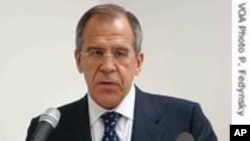Russian Foreign Minister Sergei Lavrov expects a new Strategic Arms Limitation Treaty with the United States to be signed by the time the old one expires in less than three weeks. Lavrov is also not concerned about any violations taking place while lawmakers in both countries consider formal ratification of the document.
Foreign Minister Lavrov told a Moscow news conference the Russian and American presidents firmly agree their arms negotiators should do everything at ongoing talks in Geneva to sign a new Strategic Arms Limitation Treaty by the time the current one runs out on December 5.
Lavrov said Russia and the United States will abide by the terms of the agreement pending ratification by lawmakers in both countries.
The foreign minister points to the Vienna Convention on the Law of Treaties, which obligates signatories to an agreement to refrain from acts that would defeat the object and purpose of the document.
Lavrov spoke in response to a recent statement by U.S. National Security Council Director for Russia Michael McFaul, who said a new START treaty will not be ratified in time to replace the old one. Lavrov said this is completely understandable, because the ratification process takes time.
The Vienna Convention was adopted by the international community in 1969. It governs rules for treaties concluded between states, including documents that have been signed but not ratified.
The current treaty was signed just months before the collapse of the Soviet Union in 1991. It bound both sides to cut their nuclear arsenals. Negotiators are seeking to iron out differences over the number of launch vehicles that would be permitted under the new agreement. Russia prefers fewer and seeks to ban American missiles, bombers, and submarines that are no longer armed with nuclear weapons.
On another topic, Minister Lavrov said there is no link between Russia's announcement Monday of a delay in the launch of Iran's controversial Bushehr nuclear power plant and talks about that country's nuclear program. He says the delay is purely technical and requires a small amount of additional time to ensure quality and effective operations at the plant.
He said it is also premature to talk about any lack of success in international efforts to convince Iran to accept a U.N. uranium-enrichment plan. According to the plan, Russia and France would enrich uranium for Iran to prevent that country from using it to build nuclear weapons.




